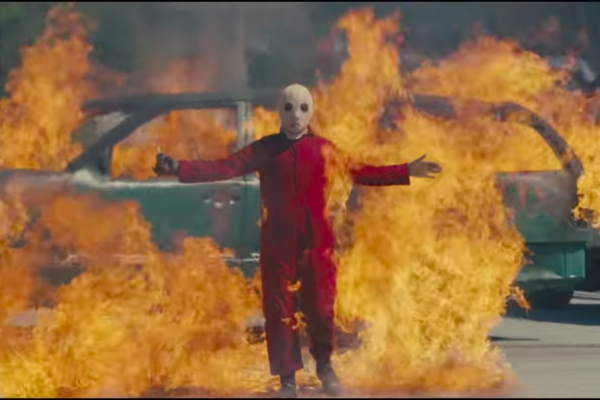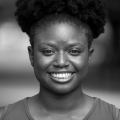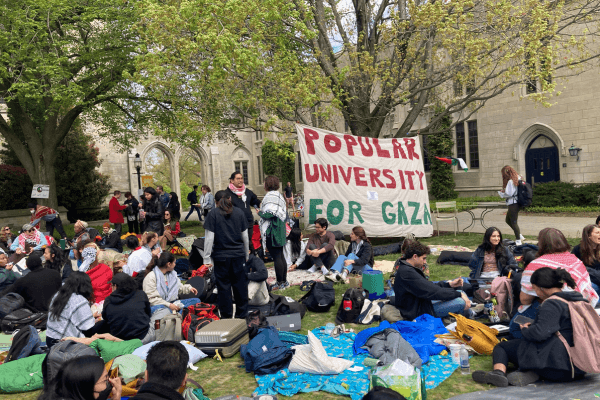Editor's Note: This review contains movie spoilers.
From Friday the 13th to Halloween, there’s nothing I love more than a great horror film that has a good twist at the end. Though they tend to follow the same predictable plot, I still enjoy the ride. Yet, there has never been a horror film that has stayed with me — until I watched Us directed by Jordan Peele. I sat in my car for 20 minutes thinking of how uneasy I felt, which I believe was the point of the film: to leave you unsettled. After watched it, I realized that Peele has not only created a haunting piece of art but has also proven to be a craftsman in the art of subversion. This film makes you question who you perceive to be the other and how that conflict manifests in our world.
Us tells the story of an ordinary family taking a summer vacation to their beach house. The mother, Adelaide (Lupita Nyong’o), is reluctant to go because she does not want to relive a traumatic event she experienced as a child. However, as the day goes on, Adelaide’s past comes back to haunt her. She and her family are met with the copies, or “tethered,” versions of themselves and spend the rest of their family vacation fighting for their lives.
What I enjoy about Peele’s films is how he uses his characters to disrupt our reality. In Us, he makes a point to not just disrupt the general audience, but specifically black audiences. The film has been lauded as one of the first of its kind with a black family as the lead in a horror film. However, upon watching the family as a black viewer, it is apparent something is a bit off. Gabe (Winston Duke), the patriarch of the family, is the prime example of Peele turning our expectations against us.
Gabe’s mannerisms are that of the quintessential American white dad. He makes corny dad jokes; he’s obsessed with one upping the neighbors and getting a family boat. All the things that red-blooded Americans are supposed to do and want.
It is this performative whiteness that signals Gabe is not like us, but rather a sanitized version of a black American man. He has all the physical and symbolic attributes of a black man, down to the Howard University sweat shirt he wears with pride. Yet, he still fits in the white American box. He’s a prime example of how everyone can have the American dream as long as you act accordingly. However, it also poses a question to us, to black Americans: How do we define ourselves and what our nuclear family looks like?
Peele continues to challenge the viewer by making us question our perception of the other and how we are quick to vilify them. This is expressed in the arrival of the tethered to the beach house.
Upon their arrival, the tethered copies of the family appear to be feral and are motivated by their thirst to kill Adelaide, Gabe, and their two children. These intruders are monsters who have lived a life mirroring this family. Yet, once we find out toward the end of the movie that Red, Adelaide’s tethered copy (also played by Lupita Nyong’o), was once one of us, our outlook on the whole situation changes. Who we perceived as the other is one of us, making the audience ask: Who is the victim and who is the villain?
The family in Us represents all the aspects of American life from the nuclear family, the vacation home, even down to the boat. However, while sitting down with their tethered copies the family asked who they are, and Red responds, “We’re Americans.” The fact that Red identifies them this way challenges the picture-perfect American life that is shown in the film. The narrative of what is American tends to focus on the pretty and patriotic image of America, but there’s also the ugly and dangerous part that is still very much a part of American identity.
When we are first introduced to Red, she details her life in another parallel world below. While Adelaide has lived the cookie cutter American dream, Red has lived a nightmare. While Adelaide had warm food, Red ate raw rabbit. While Adelaide gave birth to her children, Red gave birth to monsters. Red’s uprising was not just for revenge but an attempt to allow a silenced group to be heard. Unlike her tethered family, Red was aware of the life she was missing and the inhumanity the tethered experienced below.
We’ve seen a similar story somewhere else before. Moses, a baby sent away from his people, was raised as royalty and grew to lead the charge to free the Jews from Egypt. Even the story of Jesus, the son of God, sent down to earth and raised among humans to die for our sins teaches compassion for the other. In a cinematic parallel to these biblical stories, Red’s character exemplifies the complexities in demonizing the other when we see them in ourselves.
Peele continues to challenge the audience by engaging the relationship between religion and science. Though the audience is not told exactly how the tethered are made, we know that they are exact copies of humans, the only flaw being that they share a soul. Science was able to copy the body and all its physical attributes but was not able to duplicate the soul. This is a common trope in film: When humans try to manipulate nature, it fights backs.
In the case of Us, humans meddled with nature and created a monster. This relates to the appearance of the verse in Jeremiah 11:11, which young Adelaide (Madison Curry) sees before she ends up meeting her tethered counterpart. The verse reads: “Therefore thus says the Lord, ‘Behold, I will bring evil upon them, which they shall not be able to escape; and they shall cry unto me, but I will not listen to them.”
The passage in context refers to God telling the children of Israel that since they have decided to follow other gods instead, they have fallen from grace and will not be saved from God's wrath. This verse foreshadows the rise of the tethered and the destruction that they will soon bring to the world. In the film, humans have gone against God’s will by playing God. At several points, the characters call the police for help and no one comes. Just as God did not come to save his people in the Jeremiah passage, there is no one to save us from the tethered. The demise of society is by our own hand.
After thinking about all the subversive ideas about otherness and identity that the film plays with, what left a lasting impression on me as a black creative was the representation of a dark-skinned black family as both the antagonist and protagonist of a horror film. Seeing a black woman given a lead role in a horror film with characters possessing complexity and depth was a breath of fresh air.
I had the opportunity to see the Us premiere at Howard University. From the fraternity strolls, to the Howard chants, to the crowd screaming in unison, I could only describe it as a joyous celebration of black art. To be in a room filled with people that look like you, watching a horror film with characters that look like you, who also survive at the end of the film, is a priceless moviegoing experience.
In the last minutes of the question and answer portion of the premiere, Winston Duke was asked about the affect the film would have on the industry. Duke stated that when you change symbolism, you get to redefine it. This was a powerful statement and nothing short of the truth. Showing different images and sides of black characters in film changes what is seen as symbolically black in the media. It changes the roles we are given, the stories we tell, and how we are depicted on the screen. When those outside of our community see themselves in a black character, it further blurs the lines between us and them.
The fact that this is a black family puts that stereotype of what a true American looks like on its head and redefines the image of what and who is American. That representation not only opens doors for different types of narratives of black people but also how we as black people view and define ourselves.
Responding to the last question after the screening, Peele shared that he wants Us to start a dialogue in our country. As a nation, we are at a point where everyone is picking a side and pointing fingers at the opposition without taking the time to have a real conversation. What better way to start a dialogue when we realize who we perceive as the “other” is just like us.
Got something to say about what you're reading? We value your feedback!







